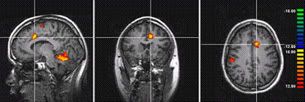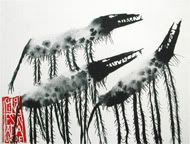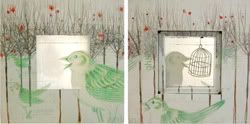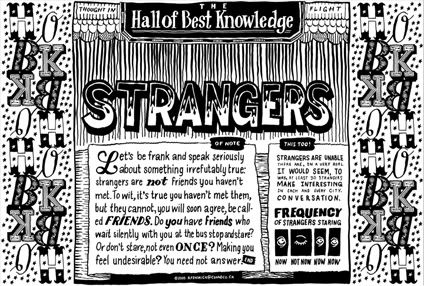
A study by Stanford Researchers together with the MRI technology company Omneuron demonstrates that patients can lessen their pain greatly by looking at a real-time fMRI neuro-imaging scan of the rostral anterior cingulate cortex in their brain, which is closely related to pain. By experimenting with different techniques while able to visualize the results directly, patients were able to play a sort of hot and cold game to learn what works best, decreasing total pain by an average of 64%. By learning the basic techniques from working with the machine, researchers hope that people can learn to strengthen the neural circuits responsible for lessening pain while outside of the lab.
source article from wired news
study available at the stanford web site
Sunday, February 26, 2006
thoughts watched and willed away - controlling pain
Posted by
Jim
at
8:39 PM
0
comments
![]()
Colombian artist Catalina Estrada

visit her web site
idea via boingboing


Posted by
Jim
at
8:22 PM
1 comments
![]()
Sunday, February 19, 2006
"Baby Cages keep me safe from my pit bull puppy doggy."

Remember Bonzai Kittens? Welcome Babycage.net.
The top-rated greek news channel, Alpha TV, recently bit the bait, falling for one of the most obvious new internet hoaxes, babycage.net. Expressing public disgust and outrage, Alpha TV referred to it as another instance of "American self-indulgence" and a step towards a new-Orwellian society.
Babycage, spoofing the American tendency to keep children on leashes, go one step farther, offering a number of child-containment facilities, including the baby escort (above), the teenager cage, and the multi-baby cage.

idea via metafilter
Posted by
Jim
at
6:20 PM
0
comments
![]()
Saturday, February 18, 2006
video collage of tunnel accidents set to dance music: biting postmodern media critique or perverse adolescent expression?

David Pescovitz recently posted this link on boing-boing, remarking that there was something "uncomfortably engaging" about the video. The video reflects a sort of naturalization of terror, the way in which a lethal event on the news will be surpassed minutes later by gum commercials, pop music, and reality television. Reflecting our virtual obsessions with reproducing reality, the real itch we can't scratch is the dim awareness of total falsity that normal television brings, causing the voyeuristic mas(s)ochist masses to demand entertainment that presses closer to the reality we feel is denied us. The unsettling part of watching people dying in tunnel accidents to dance music is the eerie way in which it doesn't feel unnatural at all, but just an everyday television experience.
watch video here
idea via boing boing
Posted by
Jim
at
5:01 PM
0
comments
![]()
Thursday, February 16, 2006
The Hall of Best Knowledge

The Hall of Best Knowledge is a weekly comic panel done by Ray Fenwick in Halifax. The first 35 panels are up for viewing on his Flickr collection.
via Drawn!
Posted by
Jim
at
3:47 PM
0
comments
![]()
Monday, February 13, 2006
Nazi swing music from the 30's

For the novelty obsessed, WFMU's Beware of the Blog has posted a collection of Nazi swing music from the 1930's by a band called Charlie and His Orchestra. The band was led by a man named Karl Swendler, who broadcast Nazi-themed big band and swing hits every night throughout the 1930's to Canada, the U.S. and Great Britain.
Along with the collection of MP3's, they have a link to a cogent and interesting article on the purpose of propaganda by the same man. If you weren't aware that he was pure evil you might actually agree with him. The Nazi's are not mentioned by name very often throughout the article, and it is surprisingly lucid.
Travel here
Posted by
Jim
at
9:05 PM
0
comments
![]()
Sunday, February 12, 2006
One step closer to immortality: Klotho gene may increase human life span by 30%

Scientists in the United States have discovered a gene in mice, named Klotho after a Greek goddess who spins life's thread, that extends their lifespan by about 30%. There is a similar gene in humans, that if activated through gene therapy could have similar results for us. The mice in the new experiments tended to be less fertile, and the gene may also predispose people to diabetes. The miracle of the gene seems to work through reducing oxidative stress, a key cause of ageing, and the gene tends to delay many of the effects of old age, such as the weakening of bones, clogging of arteries, and loss of muscle fitness.
source articles at BBC NEWS and ScienCentral
Posted by
Jim
at
6:44 PM
0
comments
![]()

